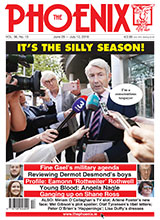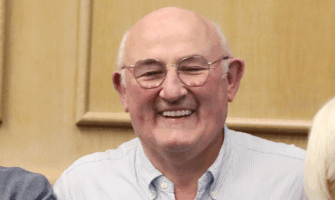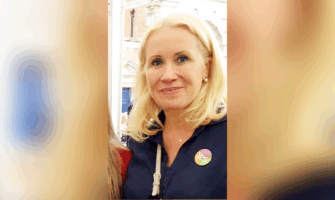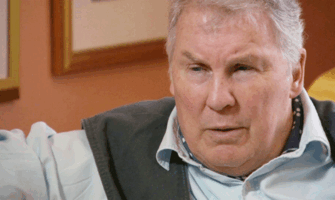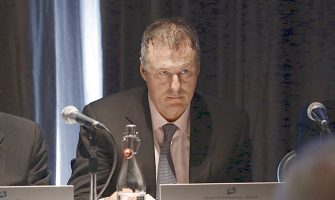
Eamonn Rothwell
THE BOTCHED arrival of the giant WB Yeats car ferry represented a bloody nose for Eamonn “Rottweiler” Rothwell, the loaded chief executive of Irish Continental Group (owner of Irish Ferries). The public relations disaster set to cost the company millions of euro has not fatally wounded the man who has been calling the shots for over a quarter of a century but other storms are brewing and with Brexit on the horizon, conditions could get very rough indeed. Will Rothwell decide to jump ship?
The boy from the Liberties (complete with strong Dublin accent) has certainly done well for himself. Born with anything but a silver spoon in his mouth, Eamo was estimated to be worth a cool E204m in The Sunday Times 2018 Rich List published in March, which represented a nice €60m jump on the previous year’s guesstimate. A flash operator, he sported designer stubble when it was rare in the boardrooms and has a taste for Italian suits and sports cars. The vast bulk of Rothwell’s wealth is accounted for by his hefty 15.4% stake in Irish Continental Group (ICG) – a mammoth holding for the chief executive of a listed company, one that dwarfs the stakes of other head honchos here. Indeed, Rothwell personally is the firm’s largest single shareholder, a position that gives him far greater influence than the average chief executive.
THE ROTTWEILER
Given his abrasive character – hence “the Rottweiler” nickname – and disdain for the media spotlight (the firm even refused to provide Goldhawk with a photo of their supreme leader), it is safe to assume the low profile adopted by ICG during the WB Yeats controversy was down to the Rottweiler’s preferred battle strategy. Surprisingly, the media has already lost interest, despite the large number of people affected by the cancellations as well as the €7m and counting hit that ICG is understood to have taken, so the chief executive may be sitting comfortably on the bridge. Any other senior executive who visited such a calamity on his customers and shareholders might have been expected to walk the plank.
There are strong similarities between Rothwell’s failure to engage with the media this time around and the far bigger storm that bellowed in 2005 when the hard-nosed union buster replaced the crews on his ferries with cheap labour from Eastern Europe (“outsourcing” is the polite corporate term). The move drew very strong criticism from the likes of Siptu (although most of the company’s workers were with the Seamen’s Union of Ireland) with Jack O’Connor highlighting what he called the “thuggery, brutality and the law of the jungle” evident in the dispute.
Politicians jumped on board too, including then Taoiseach Bertie Ahern, while Brendan Howlin (whose constituency includes the port of Rosslare) claimed the dispute was about “resisting the actions of a rogue, maverick company who have set about smashing the social solidarity between employers and workers in Ireland”.
There were significant protests around the country against ICG’s strategy but the Rottweiler maintained a steady course and stayed out of the fray, finally penning a column in the Indo three months into the row, headlined “Now here’s the truth about the crisis”. Today the William Martin Murphy of the High Seas feels he has been vindicated, with ICG having come shipshape through the rough waters of economic collapse.
Certainly, Admiral Rothwell can point his shareholders to the super competitive nature of the ferry company, with the huge vessels now crewed by Latvians and Poles employed through Matrix Ship Management, a Cypriot company headed by former Irish Ferries suit Peter Jordan. The minimum wage is one factor in ICG’s competitiveness, while the flexibility (from the employer’s viewpoint, that is) of rosters, etc, is another vital component. For the record, ICG’s wage bill had fallen from €68m in 2004 to just €25m five years later.
WILY BOSS
All of this sinks down to the bottom line and has been good news for investors, including the Rottweiler, with around €350m having been returned to the shareholders via dividends, capital distributions, etc since 2007. No one has benefited more than Eamonn Rothwell, who lives in some comfort in a splendid pile called Biscayne in Blackrock, south Co Dublin. (The house featured in a legal spat a few years back when the Rottweiler and his missus, Clodagh Moreland, settled a legal action with a quantity surveyor following a €1.6m renovation of the property that included a swimming pool, tennis court and a €450,000 two-storey photographic studio. The Rothwells’ barrister had claimed in court that the architects were responsible for paying the bill.)
In 2009, Eamonn Rothwell incorporated a company called Rokeby Investments Ltd with a registered address at Biscayne. This entity has ended up holding a chunk of the chief executive’s ICG shares, although the bulk is held in his own name. After the company was set up, it bought €1.7m shares from Rothwell at a cost of €23m, thus crystallising a loss for him of around €15m, given that the shares had cost €38m when he swooped in during the 2007 ICG takeover battle with Philip Lynch and Liam Carroll. That transaction would have created significant tax savings for the wily ICG boss.
And clearly Rothwell has incurred huge tax liabilities thanks to the remarkably generous remuneration package he has been enjoying at ICG for the 26 years he has been at the helm. He joined the board back in 1987 as a representative of Dermot Desmond’s NCB when the company pulled off a major fundraiser following the liquidation of Irish Shipping. Rothwell bought his first stake in the firm in 1988 and hasn’t looked back. After being overlooked for the top job at NCB in 1991 the Rottweiler decided to jump ship and landed the job of chief executive at ICG. He has been there ever since.
Apart from the controversy surrounding the 2005 re-crewing of ICG ferries and a high profile takeover battle in 2007 that left him in a stronger position than ever when Philip Lynch and Liam Carroll eventually walked away, Eamonn Rothwell has managed to keep out of the headlines. That changed at the start of this month when he sailed ICG into a storm with the announcement of a second delay in the delivery of the new €150m WB Yeats car ferry. For some reason, Rothwell had planned to start full service at the absolute peak of the holiday season on July 12 but it was announced that the start of the new service would be delayed to July 29. Now it turns out that the whole peak August season has been missed too.
“DISAPPOINTING”
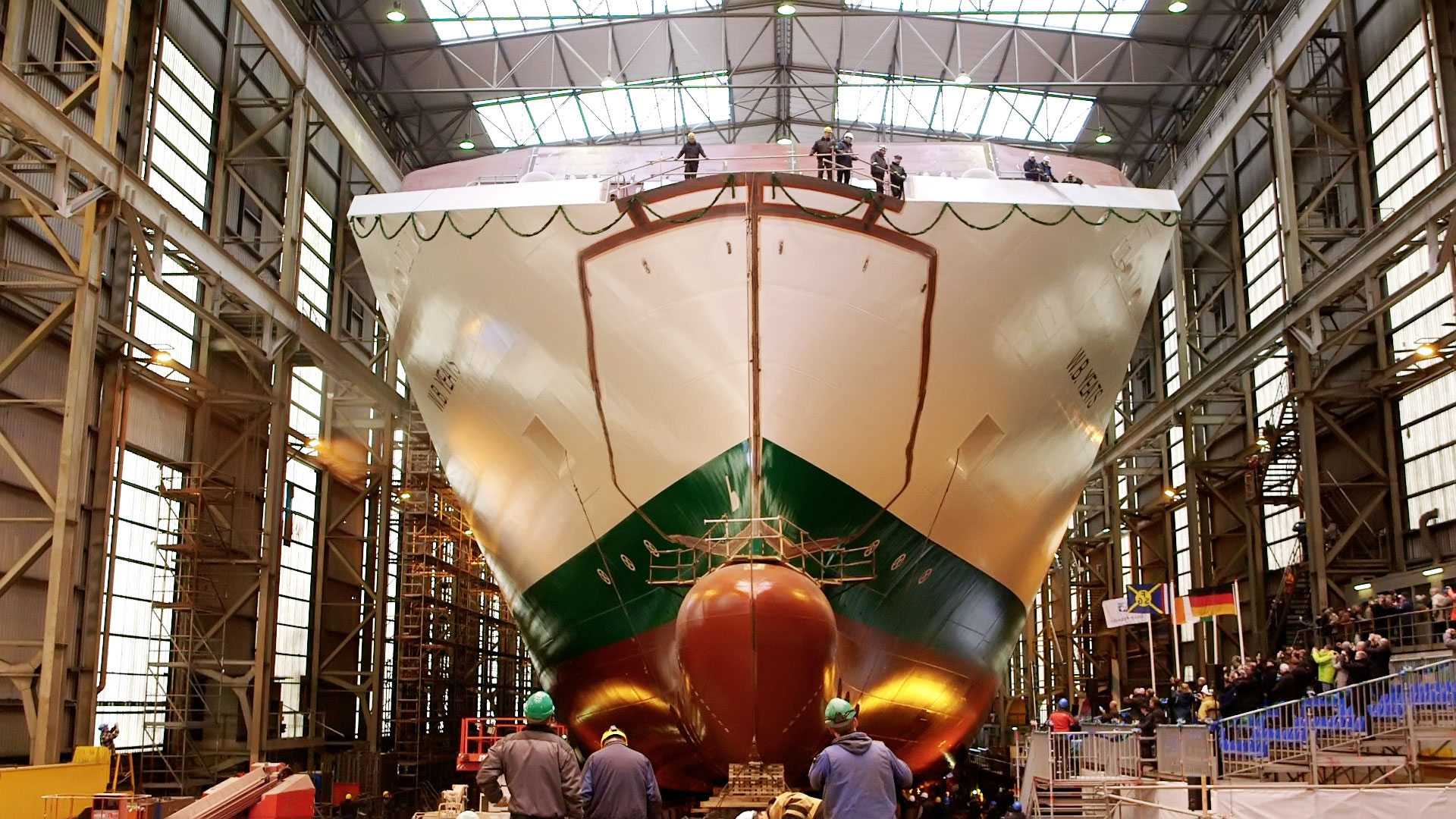
WB Yeats – In the dock
This looks very bad for Rothwell, who must take the blame for planning to introduce a huge new ferry right at the height of the summer season with absolutely no run-in. Presumably advised by Rothwell, Davy’s in turn advised investors that this was “disappointing to all concerned but not material in the context of a 40-year useful life of the ship”. German shipbuilder Flensburger is being fingered as the cause of this problem, with ICG confirming the setbacks are “due to delays in delivery of interior components for public areas and on the electrical system installation in the hull and deck outs”.
While this may be true, it is hard to ignore the size of the risk taken by Rothwell in aiming for a peak season launch rather than, say January, when there would be plenty of time to allow slippage of a couple of months. Had Rothwell been preparing for the worst (which surely he should have been), he would have parallel-booked the new vessel with the smaller leased Epsilon ferry such that the company could have minimised the scale of any disruption.
This mess is hardly the sort of thing shareholders expect from a chief executive who is so handsomely rewarded. For example, the Rottweiller has been paid a nice €5m salary over the last two years on top of the one million share options he exercised in 2016 that gave him a further gain of €4.5m and the 1.5 million options exercised last year for a further gain of €5.5m. This equates to a two-year package for Rothwell of no less than €15m. Four years ago, he loaded up the company with extra borrowings and paid out €112m to shareholders on a fixed price tender basis. This mechanism suited the chief executive who could take out over €17m cash without diluting his 15.4% shareholding.
While the WB Yeats debacle has hurt the company from a PR perspective and upset the investors (the shares hit a one-year low last week) the overall effect will not sink the €1bn ICG. What should be of more concern to shareholders is that the (delayed) arrival of the huge WB Yeats is set to have a significant impact on the company’s well-balanced car ferry portfolio servicing the Irish Sea and French routes. The new €150m overnight car ferry will replace the leased Epsilon ferry, which is little more than one-quarter its size – resulting in a quadrupling of capacity. This is a very expensive way to provide extra capacity to handle tourist trade at the height of the summer season.
On top of this, Rothwell announced in January this year that ICG is spending €165m (with the same German company that is building the WB Yeats) on a giant new daytime car ferry, with delivery scheduled for mid-2020. According to ICG’s chairman, John McGuckian (on the board for 30 years and in the chair for 14), the new vessel “is being built specifically for Irish Ferries’ Dublin – Holyhead services. The investment provides Irish Ferries with a significant increase in both its freight and tourism carrying capacity on this fast growing route”.
The Irish Sea car ferry market is mature, however, growing only a tiny 1.7% last year, with 807,000 cars carried, of which ICG’s Irish Ferries’ car ferry division handled a total of 424,000 – a 52.5% market share. The total sea foot passenger market grew an even smaller 1% to 3.13 million passengers, of which Irish Ferries is already carrying 1.65 million, or 52.7% of the market.
Given this high market share and the presence of a much larger Irish Sea competitor in the form of Stena Line, Rothwell is taking a big risk in lashing out E320m to add on huge extra capacity. Moreover, Stena Line itself has contracted to build three giant new car ferries in China, with the first to come on stream in 18 months and the other two in the following year. Expanding capacity and increased competition on mature routes can only result in a major squeeze on margins and with Brexit added to the mix it is hard to see how this can end well for Rothwell. Any price war on the Irish Sea will only result in one winner, given the dramatically bigger size of Stena Line
Also in the frame is the giant P&O ferry group with its big operation in the North, running from Larne north of Belfast to Scotland, but which operates a car ferry from Dublin to Liverpool, undercutting the other two ferry businesses albeit for a much longer trip across the Irish Sea.
The trading results at ICG are rather less impressive than has been spun, with McGuckian having advised that “2017 has been a successful year”, adding that earnings per share were a hefty 40.4% higher than last year at 41.1 cent. In his review, Rothwell highlights this 44.1 cent earnings figure. This 40.4% increase has been driven by a one-off capital gain, however. The true underlying adjusted earnings per share figure – to be found in the small print on page 21 of the annual report – is 29 cent. Not only does this represent an 8% reduction on 2016 but it is slightly below the earnings returned in 2015.
STAGNANT
Given that group turnover was up only 3% to €335m on the back of 2.4% volume increase in ICG’s core car ferry business, then the best interpretation that could be put on this is that the group had a stagnant year, resulting in reduced earnings. This may not be the story Rothwell wants to tell but with increasing fuel prices and a €7m loss incurred by the WB Yeats fiasco, it will be hard to put a gloss on the 2018 results.
The other major part of ICG’s business is the roll-on/roll-off truck division but here the 2017 results were even worse. With the total volume of trucks shipped across the Irish Sea rising over 5% to just on one million units, ICG lost market share by only recording an increase of less than 1% to 287,000 trucks. This represents a worrying drop in market share of just under 29%. Competition is increasing here and besides the current offers from Seatruck and P&O, Cobelfret Ferries has just built the biggest short route dedicated cargo ferry in the world, the so-called Brexit Buster Celine. ‘Christened’ in Dublin Port by Leo Varadkar in April, the vessel can carry 600 trucks – over twice the maximum number for ICG’s biggest ferry, Ulysses. This new capacity could really squeeze ICG hard.
Not surprisingly perhaps, ICG’s shares have been slipping, from a high of just on €6 last year to €5.30 today, a fall of 11%.
In these circumstances, the Rottweiler needs good news to justify his extraordinary remuneration. If the hugely expensive expansion backfires in the face of Brexit and increased competition then the chief executive’s position could well come under threat. But, having previously told the Sindo that retirement “is not on the agenda”, the company’s largest shareholder will be hard to outsource.



